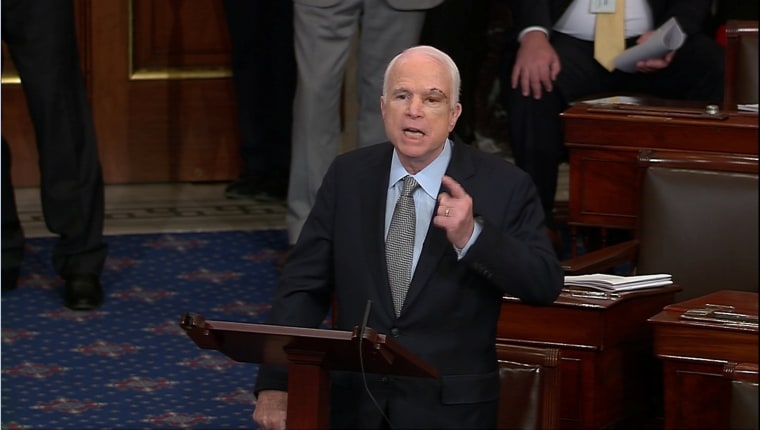It was a dramatic moment on Capitol Hill yesterday when Sen. John McCain (R-Ariz.), recently diagnosed with brain cancer, arrived on the Senate floor. Without the veteran lawmaker, Republicans would not have been able to advance their effort to take health care benefits from millions of Americans.
Soon after casting his vote with his party, McCain delivered prepared remarks on his concerns about contemporary politics and what's become of the legislative process, and much of the media, which has long gushed over the Arizona senator, could hardly contain its praise. Here, for example, was CNN's report:
In a Washington moment for the ages, Sen. John McCain claimed the role of an aging lion to try to save the Senate, composing a moving political aria for the chamber and the country that he loves.With a deep-red scar etched from his eyebrow to his temple, the legacy of brain surgery less than two weeks ago, McCain beseeched his colleagues to forsake political tribalism and restore the chamber to a spirit of compromise that had helped forge national greatness.
Roll Call published a related piece, telling readers, "Years from now, when the history of the modern Congress is written, John McCain's address to the Senate on July 25, 2017, is likely to stand among the defining summations of the era."
I realize that the political media has its favorites, and for a variety of reasons, McCain has long been a media darling. I'm also aware of the unique circumstances: a man who's devoted much of his life to public service, including heroic military service, is facing a serious health crisis. Those who want to celebrate McCain's work feel an added incentive to do so quickly and vigorously.
But the adulation paints an incomplete -- and to a very real extent, misleading -- picture for the public. One can respect McCain's lifetime of sacrifices while still acknowledging the glaring gap between the senator's words and his actions.
In isolation, McCain's speech was, to be sure, a powerful rebuke to institutional breakdowns in the Senate. He made a compelling case for a more constructive and more deliberative legislative process, and he did so while holding both parties to account, which all but guarantees reverence from much of the Beltway press.
The remarks did not, however, arrive in a vacuum. McCain had just cast a partisan vote in support of an indefensible health care process, which intends to end with a bill that does not currently exist. The senator sang the praises of "regular order" in the Senate after casting a vote that ensured there would be no regular order on this issue.
McCain simultaneously condemned and protected a process he apparently opposes and supports. He expressed severe disappointment in his colleagues trying to pass major legislation without hearings or deliberations, and then rewarded those who've disappointed him, ensuring their victory.
The senator proceeded to announce his opposition to his party's latest proposal, which he then voted to support just six hours later.
If McCain's speech "stands among the defining summations of the era" in future history books, let's hope the chapter also acknowledges the profound contradiction between his words and deeds -- which, in a crushing sense, really did make this "a Washington moment for the ages."
